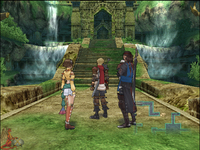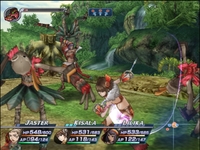|
Regardless of one's stand on their eternal conflict with ninjas, it is difficult to argue that pirates don't hold a special place in our hearts. After all, they are the guardians of an adventurous, quasi-mystical past that never really happened yet still managed to grant us the unending boons of cheesy theme park rides and horrible Hallowe'en costumes. What could be better than pirates, then, one wonders? That's simple. Pirates in space.
Enter Rogue Galaxy, the latest PlayStation 2 title from Japanese developer Level-5, now new and improved in its stateside incarnation. It stars the aptly named Jaster Rogue, a young boy with an oddly shaped birthmark who, after being orphaned and raised by a priest, lives a simple life on a small desert planet that just happens to be under the thumb of a large interplanetary empire. One marauding quadruped and a case of mistaken identity later, he finds himself recruited into a plucky band of space pirates on an uncertain quest by the robot Steve and his short, portly companion Simon. Certain elements of all this might feel a bit familiar; sadly, this familiar feeling persists throughout the narrative. Suffice it to say, secret identities will be revealed, ancient powers will manifest themselves, and the combined strength of everyone's hearts will be instrumental in saving the day, proving once and for all that the other four planeteers ain't got nothin' on the kid with the monkey. Nevertheless, parade of clichés aside, the plot is engaging enough to not distract from the gameplay, so long as one is willing to accept that there's nothing new there.
Of more direct appeal, however, are the game's visuals. Again, the cel-shaded look will be familiar to those who have played through Level-5's other recent offerings (particularly Dark Cloud 2/Dark Chronicle), but not so much that they appear stale. Quite the contrary, in fact, as Rogue Galaxy's graphical style appears both crisp and vibrant, allowing it to convincingly present a wide variety of disparate environments, from the gritty, eternal night of mining planet Vedan to the lush tropical jungle of Juraika, without ever seeming to rehash the same setting later on. In fact, the individual characters appear so detailed and unique that it becomes difficult to find any two random folks wandering about town who appear alike. Finally, parsed between these in-engine displays are some really beautifully rendered cutscenes of space travel and other such things which only serve to punctuate the unusual level of visual splendor the game offers.
 Let's just go in and ask for directions.
Let's just go in and ask for directions.
|
|
Despite all this beauty, Rogue Galaxy begins in an austere fashion, proffering only a stark, white title screen. The audience probably won't be seeing very much of it, however, as the vaguely operatic chant that's played over it will no doubt have players rushing to load their saves. This piece, though no doubt intended to convey a sense of majesty, is nonetheless one of the most grating and overpowering bits of music ever encountered in a video game. Thankfully, it appears only a few times within the game proper, and then only fleetingly. The rest of the background music, though not particularly memorable, is pleasant and varied enough, meshing well with the game's various locales without becoming a distraction.
The other aural aspects of the game are a little more remarkable. The sound effects, for one, are solid and don't detract. What really shines, however, is the voice acting, with regards to both depth and quality. Each cast member is nothing if not spot on with their respective performances - a fact which not only serves to differentiate the various primary characters, but also to give each enough personality to legitimately capture one's interest despite their largely archetypal biographies (robot with aspirations of humanity, ex-soldier with crippling regrets and a drinking problem, etc.) Moreover, the game simply has a ton of spoken dialogue, not all of which is reserved to cutscenes. In the field, each party member will have their own unique banter about the present situation which is always amusing and actually serves a purpose at times, such as when characters remind the player to stop and save. This running commentary, as well as the overall talent of the voice cast, save the game from devolving into melodrama entirely.
The stellar voicework serves to enliven what would otherwise be a simple corridor crawl. For that is what Rogue Galaxy is, at heart, as players spend the majority of their time guiding the three-man party (of which Jaster must be a part) along circuitous but largely linear paths between set destinations. Frequently during this journey an alarm will sound, heralding the spontaneous appearance of enemies and the launching of a combat system which resembles typical action-RPG fare with a bit of menu-driven item and ability use thrown in. The length of most of these encounters will be spent hacking and slashing until the action bar needs a recharge, but that won't be for lack of anything else to do, as each character has a secondary, often ranged attack, and is also capable of picking up and tossing various debris (or the enemies themselves) around.
Though players can switch freely between active and reserve party members whenever they want, they'll only be able to control one character at a time, leaving the manipulation of the other two to a functional but largely inept AI. The game attempts to compensate for this by having the AI-controlled characters dole out command suggestions which can then be executed with the press of a shoulder button. However, their advice is either obvious or boneheaded, and actions taken via this route are actually slower than they would be if players simply opened the menu and did the choosing themselves, rendering this an option better left disabled. Moreover, some foes are only vulnerable after being hit with certain attacks which the AI will deliver either unreliably or not at all. Thus, it often falls to the player to sift through menus and juggle characters on a regular basis in order to defeat even the most basic enemies, a fact which only becomes more infuriating as time goes by.
 Takin' out the trash.
Takin' out the trash.
|
|
Still, battles eventually conclude, and when they do, rewards come in the form of the typical fare of experience, items, and money, as well as weapon growth. The latter is a function of one of the game's two rather interesting growth systems, weapon synthesis, in which pairs of guns and blades which have been "seasoned" enough by combat can be fed to a small, sentient purple frog (seriously), in order to create something completely new. The other, the Revelation Flow, provides a use for a lot of the junk players will be picking up, offering a grid for each character in which certain items can be inserted in order to unlock new abilities. Like the battle system, however, these parts of Rogue Galaxy come with their own aggravations. For instance, many of the revelation items are far too scarce and, as the game progresses, simply stop dropping in favor of the next tier of items, necessitating a lot of tedious grinding and backtracking in order maintain character growth. Likewise, the weapon combination process, though it has its own entry in the menu screen, can only be launched by actually digging through the already crammed backpack in order to find the aforementioned purple toad and then again mounting another foraging expedition in order to find the desired pointy objects, a ritual which quickly grows tiresome.
A degree of redemption is found, however, in the breadth of side content the game provides. Throughout the game, the player will able to hunt "quarries" a la Final Fantasy XII's marks, synthesize items by piecing together various bits industrial machinery in the game's Factory from blueprints, and even hunt for little war insects that can be trained and sent into grid-based tactical combat. These act as welcome distractions which, though they have their own flaws, nonetheless break up the otherwise straightforward main game, and can even be rather engrossing if they're given a chance. There are even a few bonus planets, one midway through the game and the other following the credits, that can provide quite a bit more gameplay. In fact, should one choose to do all these sidequests, a good 20 additional hours can easily be tacked onto the game's existing 30-40 hour playtime.
Even with the deluge of minor annoyances, the game as a whole remains quite easy. This is due to a number of things, most notably the presence of far too many save points, all of which are interconnected via a teleport network that allows the player to jump back to town with impunity. As if that weren't enough, the battles themselves begin at a moderate level of challenge and then drop off precipitously as Jaster & Co.'s abilities become powerful enough to slaughter an entire encounter's worth of baddies with one use. And it's not as though MP is a limiting factor, since the party will be carrying far more items than it can possibly use, and even should they run low, there's a gate back to the shop with every save point. Sooner rather than later, the player will likely find that the only things that even give him or her pause are those enemies which are (often temporarily) immune to ability damage.
In short, Rogue Galaxy is a game with a cavalcade of minor flaws which prevent it from being really memorable. Still, it's an entertaining ride, and if one is willing to work past the little technical problems, there's definitely fun to be had.
Review Archives
|









